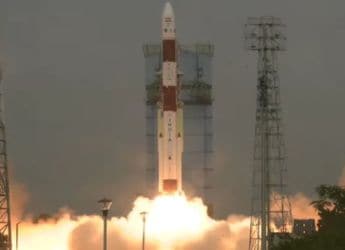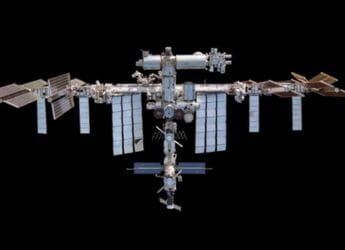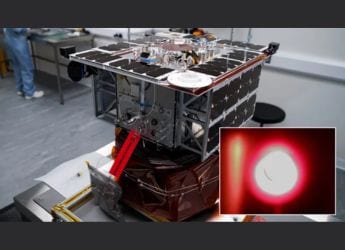- Home
- Science
- Science News
- Environmental Impact of ISS Deorbit in 2031 Raises Concerns on Oceans and Atmosphere
Environmental Impact of ISS Deorbit in 2031 Raises Concerns on Oceans and Atmosphere
Concerns regarding the ISS deorbit in 2031 highlight environmental impacts on oceans and Earth’s atmosphere

Photo Credit: NASA
The International Space Station pictured from the SpaceX Crew Dragon
The scheduled deorbit of the International Space Station (ISS) in 2031 has raised questions regarding potential environmental impacts. The 450-tonne orbital outpost, which has experienced issues such as coolant leaks and structural cracks, is expected to be retired in a controlled re-entry over the South Pacific Oceanic Uninhabited Area, also known as Point Nemo, as per reports. This remote location is often used as a "spacecraft cemetery" due to its distance from populated areas. However, concerns are being raised about its implications for Earth's atmosphere and oceans, according to various reports.
Environmental Impact on Oceans and Atmosphere
As per a report by Space.com, the ISS's deorbit plan, involving controlled disintegration in Earth's atmosphere, has been endorsed by NASA to minimise risks. Concerns about pollution, however, have been highlighted by researchers and advocacy groups. Physicist Luciano Anselmo from the Space Flight Dynamics Laboratory in Pisa, Italy, in a statement, said that while oceanic pollution caused by space re-entries is negligible compared to other human activities, the effects on the upper atmosphere could be significant and are not yet fully understood.
David Santillo, a senior scientist at Greenpeace International, in another statement, indicated that the absence of international regulations for space hardware disposal complicates such operations. According to reports, Santillo suggested that frameworks such as the London Convention could address these issues in the future. Advocacy groups, including the Ocean Conservancy, have also flagged the use of oceans as dumping grounds for space debris as a matter of concern.
Future Implications for Space Exploration
The planned deorbit has sparked discussions about the long-term management of large space structures, as per sources. Darren McKnight, senior technical fellow at LeoLabs, warned in reports that future space stations could face similar challenges, necessitating more robust disposal methods. The Aerospace Safety Advisory Panel (ASAP) had earlier emphasised the urgency of developing deorbit capabilities for the ISS to avoid uncontrolled re-entry scenarios, a recommendation reiterated in its recent report to NASA.
While the controlled disposal of the ISS is considered the safest option, its potential environmental consequences continue to be evaluated by experts and stakeholders globally.
Catch the latest from the Consumer Electronics Show on Gadgets 360, at our CES 2026 hub.
Related Stories
- Samsung Galaxy Unpacked 2025
- ChatGPT
- Redmi Note 14 Pro+
- iPhone 16
- Apple Vision Pro
- Oneplus 12
- OnePlus Nord CE 3 Lite 5G
- iPhone 13
- Xiaomi 14 Pro
- Oppo Find N3
- Tecno Spark Go (2023)
- Realme V30
- Best Phones Under 25000
- Samsung Galaxy S24 Series
- Cryptocurrency
- iQoo 12
- Samsung Galaxy S24 Ultra
- Giottus
- Samsung Galaxy Z Flip 5
- Apple 'Scary Fast'
- Housefull 5
- GoPro Hero 12 Black Review
- Invincible Season 2
- JioGlass
- HD Ready TV
- Laptop Under 50000
- Smartwatch Under 10000
- Latest Mobile Phones
- Compare Phones
- Vivo Y500i
- OnePlus Turbo 6V
- OnePlus Turbo 6
- Itel Zeno 20 Max
- OPPO Reno 15 Pro Mini 5G
- Poco M8 Pro 5G
- Motorola Signature
- Vivo Y50e 5G
- Lenovo Yoga Slim 7x (2025)
- Lenovo Yoga Slim 7a
- Realme Pad 3
- OPPO Pad Air 5
- Xiaomi Watch 5
- Huawei Watch 10th Anniversary Edition
- Acerpure Nitro Z Series 100-inch QLED TV
- Samsung 43 Inch LED Ultra HD (4K) Smart TV (UA43UE81AFULXL)
- Asus ROG Ally
- Nintendo Switch Lite
- Haier 1.6 Ton 5 Star Inverter Split AC (HSU19G-MZAID5BN-INV)
- Haier 1.6 Ton 5 Star Inverter Split AC (HSU19G-MZAIM5BN-INV)

















